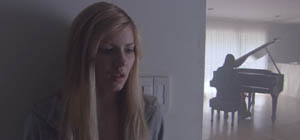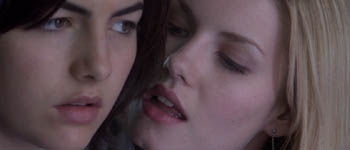|
A short way into this film, I began to get that sense that occasionally pervades my viewing experience, which was that I was watching one of those "other" movies. Not one that's well-known or respected, or has some loyal following somewhere, but simply one of those other ones, the ones that just fill up the shelves at your local rental house and keep the dust below them from escaping. Her father having recently died, a deaf and mute girl named Dot goes to live with her godparents and their bratty daughter Nina. The home is essentially the same home as that of every highly dysfunctional family on film, in that it's lit a cold blue and is mostly empty. Despite being apparently unable to speak, Dot narrates sadly about her desire to be invisible to the world. She presumably could've taken some helpful hints from director Jamie Babbit, who essentially made this film invisible to the moviegoing public. 
Moreso than just about anything in the film itself, the cover image does leap out at passers-by. The image shows Elisha Cuthbert (Nina) seductively leaning towards Dot's (Camilla Belle) ear, as if whispering something that you, the potential audience, simply need to hear for yourself. While the composition in question does occur in the film, and is one of the better scenes, it's not in the service of what you've doubtlessly assumed. It's obviously a choice designed to influence one's likelihood of picking it up, but what would've been even more effective would've been to actually make the film be one which fulfilled such hopes. All the way through, the film remains cold to mid-temperature, generally declining to thrill or stimulate. Dot's new mom pops prescription painkillers like candy, and Nina regulalrly steals them, presumably to cope with the fact that her dad is regularly doing her. How and why these people ended up in such a fucked-up scenario is something we're never told. Is the father turning to his daughter because his wife is a junkie, or is it vice-versa? The script doesn't seem to care about such things. If this film had been made in the '70s, it would have been very different. Back then, when people made movies about the darker side of human nature, they seemed to revel in exploring it; nowadays, there's a pronounced sense of restraint. One scene between Nina and her insufferably bitchy friend Michelle features both girls lying in bed watching a movie, with Michelle coyly asking, hypothetically, how one would ever know one's own skill at kissing without a good, trustworthy friend who would be willing to give an honest answer. The scene ends with nothing coming of it. All throughout, the film screams out its intention to give in to scenes of lustful girl/girl love, and never does. That's fine, if that's not what the film was trying to do, but if not, why the endless teasing? What the film actually does is to show how everyone, in this world of unhappy people, openly gushes their uncensored thoughts at the deaf girl. Nina's mom casually refers to Dot's dead mother as a slut, the father speaks of his unhealthy desire for his own daughter, and Nina herself constantly slags on the poor newcomer as a freak who "looks like the janitor," in that artificial way that Hollywood likes to pretend that an actress much prettier than just about anyone you probably know is "dumpy" when she's not wearing lipstick. Nina similarly spends much time asking if she looks fat, even though Elisha Cuthbert looks far too slender for the question to feel remotely ambiguous. 
Eventually Nina, spurred on by a growing suspicion that Dot isn't really deaf, breaks down in a whispered confessional outburst about her desire to kill her incestuous father. The aformentioned box-art scene, it's quite affecting, but seemingly on the wrong levels. Beyond the obvious attempt to shock the other girl into admitting that she can really hear and speak, it plays as the only steamy scene in the film, with Nina deliciously gushing lurid details of her loathing and hatred for her father in a whispered, breathy rage that sounds more than anything like a rejection of the male-female relationship in favor of some new territory, which, as previously noted, isn't what the film ever actually does. What's missing is any sense of real grief or vulnerability. She does get to play those feelings before it's all over, but besides the ultimate sisterly bonding between herself and Dot, there seems precious little clarity to the ending, with its late-game attempt at going the route of dark thriller. The film, in the final analysis, has no clear idea what it wants to be. There's some attempt made to make a story about broken communication, and on those levels it achieves some degree of success, but it flounders halfway down too many other paths to feel like it really had a goal in mind. It's just disappointing that a film which spends much time showing Elisha Cuthbert in her underwear turned out to be so timid. Who was that decision supposed to please? -review by Matt Murray
|
|
||||||||